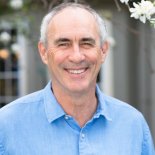The public’s perception of chronic pain is that it’s unsolvable and the best one can expect is to live well with it -- or turn to surgeries to attempt to fix it.
The reality is that modern neuroscience research has revealed answers and it is a solvable problem.
According to Dr. David Hanscom, the success rate for spinal surgery is a meager 22 percent. Even worse, a failed spinal surgery can virtually destroy one’s life.
In his book,
Do You Really Need Spine Surgery?, Dr. Hanscom shares information to help you and your medical provider make the best choice for your needs.
Listen as he joins Dr. Roizen to explain the science behind chronic pain and why you may be able to find relief without surgical intervention.
Want better health and nutrition? Now you can get personalized supplement recommendations and custom vitamin packs delivered to your door! Go to PersonaNutrition.com/Roizen and take your free assessment and get 50% off your order today. - sponsor 
Bonus9 Effortless Ways to Lose Weight
Featured Speaker:
David Hanscom, MD
Dr. David Hanscom is an orthopedic complex spinal deformity surgeon who was based in Seattle, WA. He retired in 2018 after 32 years in practice. Today, his mission is to re-introduce true healing into medicine. He feels that doctors should be given the time to listen and understand their patients. Life situations surrounding their medical problems have a tremendous impact on care and outcomes.
He was part of a movement that began in the 1980’s that espoused that persistent low back pain was best solved with surgery. However, he happened to combine forces with several national-level rehabilitation physicians early in his career and quickly noticed that patients were having better outcomes when surgery was combined with a thoughtful rehab approach. When the data came out in 1993 that the success rate for a fusion for LBP was less than 30% at two-year follow up, he immediately stopped performing the procedure. In the meantime, he descended into his own deep 15-year pit of suffering from severe chronic pain. It began with a panic attack and he eventually developed 17 different symptoms. He had no idea what hit him, and no one could explain what had happened.
During this period, he spent four years in Sun Valley, ID as primary care spine surgeon. He was able to observe the onset of chronic back pain from the beginning. Since he wasn’t performing fusions for pain, he tried multiple different approaches and gradually the treatment paradigm emerged that is presented in the two editions or his book, Back in Control: A Surgeon’s Roadmap Out of Chronic Pain. He began to witness patients improving that he thought had no hope and his 17 symptoms also resolved. Over the next 15 years, he watched hundreds of patients not only become free of pain but thrive at a level that they had never experienced. Even patients who had surgical problems cancelled their surgery because the pain resolved, which is the foundational force behind his third book, Do You Really Need Spine Surgery? Take Control with a Surgeon’s Advice.
In spite of overwhelming data that has revealed the answers to chronic pain, the medical culture has become more aggressive in performing interventions that have repeatedly documented to be ineffective, expensive and risky. The consequences are brutal both at a societal and individual level. This ever powerful juggernaut of ineffective spine surgery caused him to quit his practice to pursue educating the public and providers about the dangers of current situation and also of the consistently effective solutions.
His efforts include:
Do You Really Need Spine Surgery? Take Control with a Surgeon’s Advice was released in the Fall of 2019. All factors affecting the outcome are considered and presented in an organized treatment grid. Maintaining his website, backincontrol.com which is the action plan of his book, Back in Control and Do You Really Need Spine Surgery? The self-directed rehab program is called, “The DOC Process” (Direct your Own Care) and guidance regarding surgical decision-making is also on this site.
Weekly blogs updating the DOC concepts.
Weekly instructional podcasts, “Back in Control Radio.”
Pending books include:
Healing Your Family’s Pain
Breaking through Anxiety
Enjoying Helping Your Patients Out of Pain
Awake at the Wound: Applying Athletic Performance Principles to Surgery
Helping patients heal from chronic pain has evolved into the most rewarding phase of his long surgical career.
